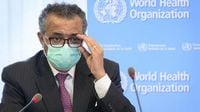The World Health Organization (WHO) faced unprecedented challenges during the COVID-19 pandemic, grappling with the complexities of a global health crisis that demanded swift action and coordination. In a recent broadcast by Europamagazin on April 6, 2025, the focus shifted to Switzerland's role in the pandemic response and the WHO's evolving strategies.
Initially hesitant to declare a pandemic, the WHO ultimately became a central figure in combating COVID-19, coordinating vaccination campaigns and assisting countries in developing effective strategies to mitigate the virus's spread. As the pandemic unfolded, the organization's importance grew, demonstrating the necessity of a coordinated global response to health crises.
According to the broadcast, the WHO's efforts included the orchestration of vaccination programs across various nations, which were crucial in controlling the virus's transmission. The organization has also been instrumental in providing support to countries in crafting their pandemic strategies, emphasizing the importance of early detection and rapid response to future health threats.
In Geneva, the WHO has been actively working on a pandemic treaty aimed at establishing a framework for early detection of potential pandemic triggers and coordinated responses. This initiative is seen as vital for preventing future health crises, ensuring that the lessons learned from the COVID-19 pandemic are not forgotten.
However, the financial implications of vaccine procurement during the pandemic have sparked significant discussions in Switzerland. A report from the Swiss Federal Finance Administration revealed that the country had to write off approximately 1.3 billion francs due to the procurement of COVID-19 vaccines that were ultimately not used. Between 2020 and 2023, the Swiss Confederation spent 2.282 billion francs on vaccines, but only doses worth 567 million francs were administered.
Moreover, vaccines valued at 268 million francs were dispatched as humanitarian aid to other countries, while another 1.447 billion francs worth of vaccines had to be 'value adjusted' or disposed of. According to Philipp Rohr, the head of communications at the Finance Administration, about 90 percent of these adjustments were due to vaccines that expired and could not be used.
By July 3, 2023, the Swiss health authorities had administered 17 million doses of the vaccine. Additionally, the federal government disposed of 20 million doses, with a significant number remaining unused in vaccination centers, pharmacies, and hospitals across the country. The Federal Office of Public Health (BAG) could not specify how many doses were left over in these locations.
The rationale behind Switzerland's extensive vaccine procurement strategy was to ensure that the population had access to the most effective vaccines against COVID-19. Former Health Minister Alain Berset defended the government's decision to secure more vaccines than were ultimately needed, stating, "Safety comes at a price." He emphasized that the goal was to avoid scenarios that would necessitate drastic measures to control the pandemic.
Despite the high costs associated with this strategy, it aimed to provide the Swiss population with the latest and most effective vaccines available. However, the financial burden has raised questions about whether the federal government overstepped its budgetary authority during the vaccine procurement process, leading to criticism from various quarters.
As the WHO continues to refine its pandemic response strategies, the lessons learned from the COVID-19 pandemic underscore the importance of preparedness and adaptability. The ongoing work on a pandemic treaty in Geneva highlights the organization's commitment to ensuring that countries are better equipped to handle future health emergencies.
In summary, the WHO's management of the COVID-19 pandemic and Switzerland's vaccine procurement experience reflect both the successes and challenges faced in global health governance. The push for a pandemic treaty signifies a proactive approach to future health threats, aiming to foster collaboration and coordination among nations.





